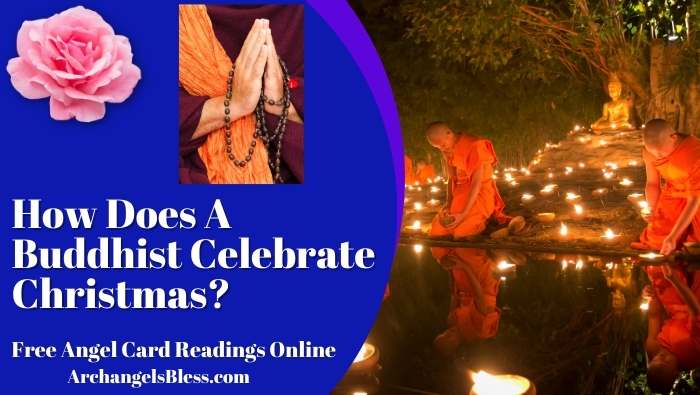How Does A Buddhist Celebrate Christmas?
Christmas is a joyous time of year for many people, but how does a Buddhist celebrate this holiday?
Buddhism is an ancient religion that emphasizes nonviolence, detachment from material possessions, and a focus on the present.
Despite its contrast with Western traditions, Buddhists can still find meaningful ways to participate in Christmas celebrations.
One way that a Buddhist may choose to join in the festivities is by focusing on compassion and loving kindness during the season.
Instead of exchanging gifts or decorating their homes for Christmas, they could instead practice mindfulness and extend kindness toward those around them.
This can be done through acts of charity such as volunteering or donating money to organizations that help those less fortunate than themselves.
Buddhists can also attempt to be more present in the moment by choosing to focus on the people and activities around them instead of worrying about their financial problems or what they do not have.
Can Buddhists Celebrate Christmas?
Can Buddhists Celebrate Christmas? For many, this is a difficult question to answer.
Although Buddhism is an ancient religion with its own set of rituals and beliefs, it doesn’t have a single answer when it comes to the celebration of Christmas.
The practice of celebrating Christmas varies among different Buddhist communities.
Some will observe the holiday by decorating trees and exchanging gifts, while others may simply use the holiday as an opportunity for reflection, meditation, or charity work.
There are even some Buddhist organizations that recognize Jesus Christ as one of their enlightened teachers.
At its core, Buddhism is about finding inner peace and discovering greater meaning in life; thus how each person chooses to observe Christmas should reflect those values.
Whether it’s through gift-giving or meditation, everyone can find a way to participate in the holiday without compromising their religious beliefs.
What Holidays Do Buddhists Celebrate?
Buddhists celebrate a number of special holidays and festivals throughout the year.
From traditional religious days to new-age secular celebrations, there are many events to commemorate.
Here’s an overview of some of the most important Buddhist holidays and what they mean to followers around the world.
Vesak is one of the most widely celebrated festivals in Buddhism and marks the birth, enlightenment, and death of Gautama Buddha.
It is observed on different days depending on a person’s geographical location; however, it usually takes place in May or June.
During this time, Buddhists gather together for prayers and worship services at temples around the world.
They may also light candles or lanterns as part of their celebration rituals.
Buddhists celebrate the birth, enlightenment, and death of Gautama Buddha on Vesak.
Vesak is also a time for Buddhists to honor their ancestors and loved ones who have passed away.
Buddha Christmas Quotes
Buddha was one of the most influential figures in history, and his teachings remain relevant today.
His words are especially meaningful during the holiday season, as they can bring peace, joy, and love to Christmas celebrations.
Here are some of the best Buddha Christmas quotes that will inspire you to have a mindful, positive holiday.
“Happiness does not depend on what you have or who you are; it solely relies on what you think.”
This quote is a reminder that our thoughts often shape how we experience life.
When we focus on things like gratitude and service to others, we can feel more connected to those around us and find happiness even in difficult times.
“You will not be punished for your anger; You will be punished by your anger.”
This quote serves as a gentle reminder that our emotions should never control us.
When we allow ourselves to get carried away by anger, it can lead us down a dangerous path.
Instead, when we feel anger building up within us, we should take time to calm down and reflect on our actions before making any rash decisions.
“Happiness is not something ready-made. It comes from your own actions.”
Happiness is an inside job. When we focus on the good in our lives, we can feel happier and more fulfilled.
We do not need to rely on external things for happiness; we can find it within ourselves.
What Is The Buddhist Version Of Christmas?
Christmas is celebrated all over the world, yet it takes on different meanings and looks different based on the culture.
In Buddhism, Christmas isn’t as widely celebrated but there are known practices that Buddhists use to honor this holiday season.
In Buddhism, Christmas is a time for meditation and reflection rather than gift-giving or decorations.
Buddhists often meditate in order to cultivate compassion and peace during this time of year.
They may also take part in other activities such as visiting temples or honoring the Buddha’s teachings with special meals and devotionals.
During the holiday season, some Buddhist communities will gather together to practice mindfulness and chanting rituals in preparation for the new year ahead.
What Do Buddhists Celebrate In December?
Buddhists around the world celebrate a number of special days and holidays each year, including December.
During this month, Buddhists can take part in a variety of religious festivities in honor of their faith.
The holiday season for Buddhists begins with Bodhi Day on December 8th which celebrates the day that Siddhartha Gautama achieved enlightenment and became the Buddha.
On this day, Buddhists meditate, sing hymns, and chant sutras to pay homage to him.
They also reflect upon the story of his life and how he attained his wisdom.
December is also a time for honoring Kwan Yin – the goddess of mercy – who symbolizes compassion and forgiveness.
December 8th is celebrated with a vegetarian feast, and followers are encouraged to donate to the poor.
What Do Buddhists Believe?
What Do Buddhists Believe?
Buddhism is one of the world’s oldest religions and it has millions of followers all around the globe.
Founded over 2,500 years ago by Siddhartha Gautama in India, Buddhism is based on his teachings, which emphasize personal understanding and enlightenment.
This article will discuss some of the core beliefs that Buddhists hold dear.
Buddhism centers on four Noble Truths: life means suffering; suffering arises from attachment to desires; suffering ceases when attachment to desire ceases, and there is a path to end suffering.
The path mentioned in this teaching is known as the Eightfold Path which consists of right view, right intention, right speech, right action, right livelihood, right effort, right mindfulness, and finally right concentration.
The Eightfold Path is the way of life that leads to the cessation of suffering.
The Buddha also taught that his followers must follow five precepts, which are: not to kill, not to steal, not to engage in sexual misconduct, not to lie, and not to take intoxicants.
How Did Buddhism Spread?
Buddhism, one of the oldest extant religions, has been a part of the human experience for millennia.
Originating in India in the 6th century BCE, Buddhism has spread far and wide from its birthplace to become a major influence in many parts of the world.
How did this religious tradition come to spread so far and wide?
The process of Buddhist expansion began when Emperor Ashoka embraced it as a state religion during his reign around 250 BCE.
This patronage was crucial in solidifying Buddhism’s presence throughout India and was further reinforced by Indian merchants and traders taking their faith along with them as they journeyed across Asia.
As Buddhism made its way across East Asia it encountered other established religions such as Confucianism and Taoism, which sometimes adopted aspects of Buddhist thought while also influencing it in some ways.
Buddhism Practices
Buddhism is one of the world’s oldest religions, and its practices have been followed for centuries.
With a focus on peace, mindfulness, and compassion for others, Buddhism offers a variety of meaningful rituals and spiritual practices for those looking to deepen their understanding of the religion.
The core Buddhist practices center around meditation and mindfulness.
This includes regular silent meditation sessions aimed at calming the mind and focusing on one’s thoughts in order to gain insight into the true nature of reality.
Additionally, Buddhist teachings stress that mindful awareness should be practiced throughout daily life as well – while eating meals or engaging in conversations with others.
This helps to promote clarity and non-judgmental observation in all activities.
Benefits Of Practicing Buddhism
Buddhism is a spiritual tradition that has been practiced for centuries and continues to be popular today.
It offers adherents an opportunity to find peace, inner strength, and improved focus through various meditations and self-reflection techniques.
While the practice of Buddhism varies across different cultures, its benefits can be universal. Here are just a few of the many advantages of embracing Buddhist teachings.
One advantage of practicing Buddhism is its emphasis on living in the present moment and being mindful of your thoughts, words, and actions.
This allows individuals to stay focused on what matters most each day without worrying about their past or future.
Additionally, Buddhists strive for compassion towards themselves and others which helps cultivate kindness, empathy, and understanding in daily life interactions.
Buddhism and Mental Health
Buddhism is a spiritual practice that explores the nature of suffering and how to achieve inner peace.
It is an ancient, Eastern religion that has been practiced for centuries in countries such as India, China, Thailand, and Japan.
Over time, Buddhism has become increasingly popular in Western countries as well due to its emphasis on mental health and well-being.
Scientific research has demonstrated the potential benefits of Buddhism for improving mental health and overall well-being.
Studies have shown that Buddhist practices such as meditation can help reduce stress levels while also increasing feelings of happiness and contentment.
Other studies have found that regular mindfulness exercises can lead to greater resilience against depression and anxiety.
In addition, Buddhism encourages self-compassion which helps individuals cultivate more positive relationships with themselves and others.
How To Practice Buddhism
Buddhism is an ancient practice that has been around for centuries and offers individuals a way to find inner peace, compassion, and acceptance.
As one of the world’s oldest religions, it can be difficult to know where to start when it comes to practicing Buddhism.
However, there are certain key elements that should be included in any Buddhist practice.
By understanding these fundamentals and incorporating them into your daily life, you can begin a journey toward enlightenment.
The first step in learning how to practice Buddhism is developing an awareness of the present moment.
This means staying aware of what you are feeling in the moment without judgment or attachment.
You can do this by meditating regularly or engaging in mindful activities such as yoga or mindful eating.
The next step is to develop compassion for yourself and all beings.
This can be accomplished by practicing generosity, gratitude, and forgiveness.
Next, you it’s beneficial to cultivate wisdom by learning about Buddhism and increasing your knowledge of the world around you.
The final key to practicing Buddhism is to follow the Eightfold Path.
This means following the Buddhist teaching of right view, right intention, right speech, right action, right livelihood, right effort, right mindfulness, and right meditation.
These principles are helpful in developing a more positive and mindful life.
You may also enjoy…
Receive FREE Angel Card Readings [Anytime Day or Night]
Winter Solstice Spiritual Meaning
May you remember how Divine you truly are!
In Love & Grace,




0 Comments